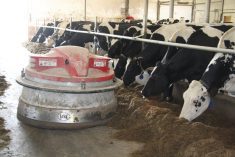Emergency livestock care programs are developing across the Prairies as producers face a long winter with limited markets and short feed supplies.
Alberta Farm Animal Care has developed an emergency response plan for livestock similar to the program offered last year when drought resulted in feed shortages across most of the province. This year bovine spongiform encephalopathy has seen market prices plunge for cull cows, bulls and alternative livestock. Continuing feed shortages and no cash flow could cause distress on many operations.
“We’re providing counsel to people who are out there and concerned about the well-being of their animals this winter,” said AFAC manager Susan Church.
Read Also

Manitoba extends Crown land rent freeze
Manitoba government links the continued rental rate freeze on grazing and forage leases to economic and environmental challenges facing the industry
Producers have already been forced to kill some older, weak animals because there are no cull markets and in some cases they cannot afford the veterinary bills.
The plan offers a toll-free number to help producers make sound and humane decisions. Sufficient feed and bedding will be made available for use in emergency seizure and surrender cases so that livestock in distress are cared for properly. Money will be used to help the animals. No funds will flow to producers.
Veterinarian Ray Fenton has been contracted to work with producers of all species to ensure no animals are in distress.
Saskatchewan is revamping a program designed in 1998 to help hog producers unable to care for pigs when prices crashed.
The Farm Animal Care Council is working with the farm stress line and Saskatchewan’s SPCA to ensure all species remain healthy as producers work through this crisis of closed markets and no cash flow.
“We need to make sure we can accommodate the crisis that may happen this winter,” said manager Adele Buettner.
Manitoba is still forming a contingency plan.
“We’re doing preliminary work because people realize cows are worth $100 and it costs $300 to feed them,” said Terry Whiting of Manitoba Agriculture’s animal welfare branch.
Alberta’s toll-free help line is 800-506-2273.
In Saskatchewan, people may call the SPCA at 306-382-8166, the farm stress line at 306-787-5196 or the farm animal council at 306-249-3227. Manitobans may call the animal welfare line at 204-945-8000.















